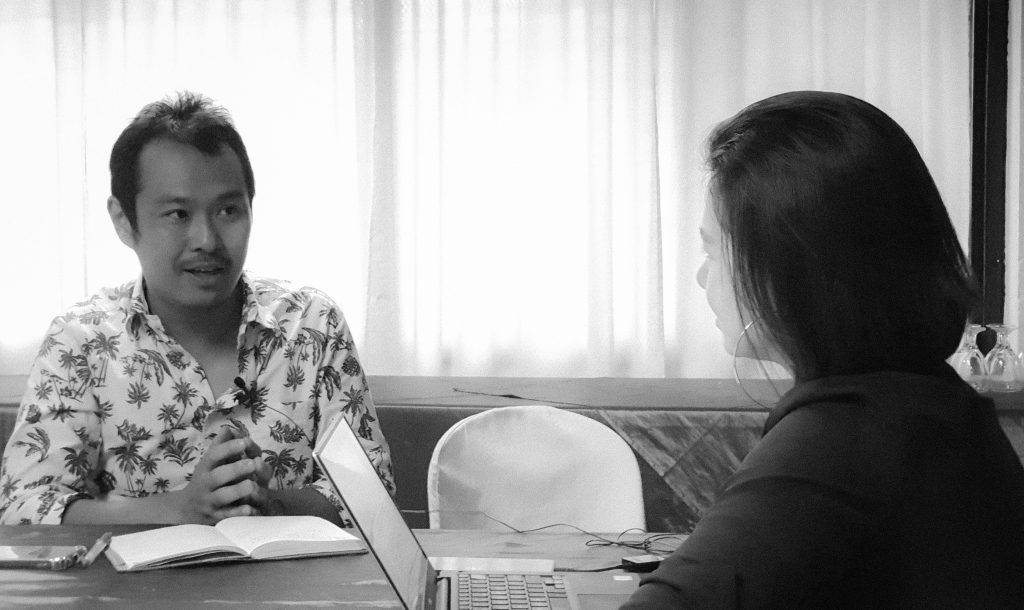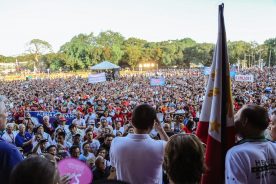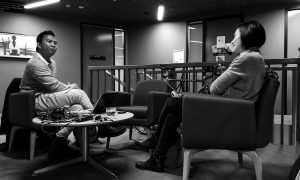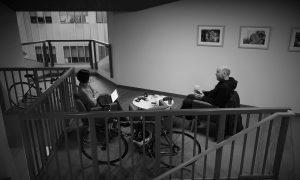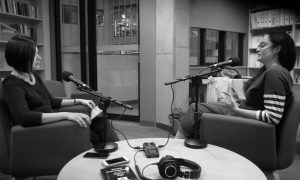In this fourth episode from New Mandala’s second series of podcasts looking at the Philippines beyond the clichès, Associate Professor Nicole Curato from University of Canberra’s Centre for Deliberative Democracy and Global Governance sits down with Wataru Kusaka to discuss the widespread notion that populist voters are deluded. Wataru Kusaka’s extensive ethnographic work with urban poor communities has helped him develop an empathetic and deep understanding of their motivations. From this experience, Kusaka emphasises the importance of recognising populist voters as concrete individuals, rather than abstract others, in the pursuit of truly deliberative democracy.
Nicole Curato [NC]: Okay, let’s start. So, the cliché we’re unpacking is populist voters are deluded voters. So, we’re all familiar with derogatory terms attached to masa voters as bobotante or stupid voters. So Wataru has conducted ethnographic research with urban poor communities in Manila and Leyte and has critical insight to share to smash this stereotype. So, hello, Wataru!
Wataru Kusaka [WK]: Hello!
NC: Thank you for joining us. We are still in Bukidnon for the Philippine Sociological Society’s Annual Conference. And I just basically kidnapped you to do this podcast with me. So, thank you. Thank you for joining us.
WK: Thank you so much for this opportunity!
NC: So, I think we should start with a question that is both normtative and empirical. So, when we talk about the Philippines or other countries, first, do you think there’s such a thing as a stupid voter. Is there a stupid voter in Japan, for example?
WK: Actually, there is a discourse of stupid voter, of course. But I don’t think—stupid voters is a kind of discourse that is othering, right? If you do not like a particular political idea or a politician, you like to other. So it’s a very effective discourse of othering to delegitimise others you do not like.
NC: So who others who?
WK: Okay, so for instance, the liberals—I think belong to the liberals in the Japan—hate Prime Minister Abe. There is ultra-right-wing and also fanatically support Prime Minister Abe, so we call them netto-uyo. Netto is net, internet. Uyo is right-wing. So, they are very much active. So, it’s kind of a term. So, the liberals delegitimise supporters of LDP and Prime Minister Abe as Netto-uyo. So, the conservatives or nationalists, they delegitimise liberals as… what’s that? I forgot the term…
NC: That’s okay.
WK: Yeah, they have a term. So, there is such like DDS, Dilawan, we also have that term of othering to delegitimise others.
NC: Right. But of course, I think in the context of the Philippines, you’re one of the best persons to ask about the stupid voter in the Philippines. Because there’s a tendency that I really really dislike of associating stupid voters with poor voters. And I say that you’re one of the best people to ask about this because you spent so much time in urban poor communities in Quezon City and then you also spent a lot of time in Leyte in Albuera. And these are supporters who voted for Joseph Estrada, for Rodrigo Duterte, and it’s so easy to dismiss them as stupid voters. So, what can you tell us about this?
WK: But I have never encountered a person… I mean…. who admit they bought their votes to a particular position. I have never encountered such. So, ‘I received money but I vote with my belief.’ So, that’s a typical answer. I have never encountered people who admit, ‘I sold my vote.’ So, if we suggest people—again, people say that selling votes is like selling yourself. So, your personality. So, it’s a kind of affront to your dignity. So, people never admit it. So, that’s my understanding. People do not admit they sold their votes, so they are not stupid. They always emphasise, ‘We are not stupid.’ This decision is out of my calculation, out of my rational considerations. That’s their typical answer.
NC: And this is part of the moral politics of the poor that you’re talking about in your fantastic book. So, tell us about that distinction between the morality or calculations of poor voters versus the elites, the liberals, the middle classes. I think what I really like about the book is it’s so brave in criticising civil society groups who claim to be the enlightened people who will bring democracy to the Philippines. And then your book says there’s this resistance the poor that that morality does not necessarily work. Tell us about this project.
WK: It’s because of my, actually, commonality with, actually, I share the kind of send of marginalisation and shame with poor because of my English. Previously, I tried to study at UP Diliman but I eventually dropped out because of my English fluency so I couldn’t understand the students and teachers discussing. So I was withdrew in the [inaudible 04:29] committee which was much more comfortable for me because nobody spoke in English so I shared this kind of sense of shame together with them. So, I’m always on the side of the poor so I encountered with many NGOs which tried to enlighten them so I was on the site. So NGO people, maybe people thought of me as a kind of strange people [person]. Anyway, so… I was just not comfortable with the discourses of NGOs, the middle class, so first it’s kind of my reflection of my sense of alienation or kind of frustration, I don’t know. It’s very much personal, actually. It’s personal. I just wasn’t able to relate myself to the enlightened discourses.
NC: Because of course, it’s such a popular discourse especially during election time for voter education programs to surface, to teach the poor not to sell the votes, which you’re very critical of as a concept. You’re also critical of trying to teach the poor how to vote properly. So, can you tell us a bit about your project dealing with poor people. How are they able to justify the votes that they make?
WK: Okay, so they have some criteria to judge because there are so many politicians coming to poor areas in election time, right? So they have to figure out who are really good candidates. So, they have several criteria. Like, ‘Madaling malapitan’—
NC: So, approachable.
WK: Oh, sorry. Like, ‘Pantay-pantay sa tingin’ so equality and also ‘matulungin’ so they have several criteria but they judge politicians in terms of… kind of range. So if the politician supports people who belong to his faction. So, it’s not a good politician. So, even though you do not belong to the factions of the politician, if you get help from the politician, that politician is good. Because the politician helps, not only—so it’s more generalised so it’s coming from his compassion, kind of, and sympathy. And also, when they receive support, those who provide support just immediately before the election are not good politicians, according to them. So, the timing and coverage are two criteria for them to distinguish who is a good politician or not.
NC: But of course, if I were to respond to that analysis, one criticism of people from democratic theory, for example, would be to say compassion is not a democratic virtue. Compassion is built on the idea that someone is more powerful bestowing care to someone less powerful. Whereas democratic politics is about the people holding powerful people into account. So, how do you respond to those criticisms that compassion should not determine how we do politics?
WK: Come again?
NC: So there’s this disconnect with power if you pick someone compassionate, you just legitimise the power inequality. That’s why democratic theorists don’t like compassion as a concept. So how do you respond to that criticism? [07:59] Kasi parang you’re justifying that it’s okay that the poor like compassionate politicians.
WK: …
NC: Or is compassion an equally good value in democracy?
WK: Because we should have more criteria to judge a leader’s capacity, not only educational background, but also braveness, compassion, there should be more capacities which we can look at. So perhaps we have so much limited characteristics or necessary characteristics of elites. It’s also possible to expand what kind of characteristic is needed for a leader.
NC: Yes, because usually with voter education programs it’s about check the policy, check the educational background—
WK: Track record.
NC: Track record, experience, and this always happens when we talk about politicians like Nancy Binay or newcomers in politics like Manny Pacquiao. It puzzles a lot of people why the poor people vote for them and they have no track record. And your work will tell us that it’s because they have other qualities that Filipinos like? Is that the case?
WK: Yeah, I think so.
NC: But of course, your more recent work, moving from your work in urban poor communities in Manila and Leyte is about President Duterte’s appeal. And I think you wrote about in the Philippine Sociological Review describing him as having a bandit-like morality. What do you mean by this?
WK: Ah, okay, so… many of my informants describe Duterte as a folk hero so I was so fascinated with the idea, not only farmers but also intellectuals, middle class people, they describe him as a kind of folk hero. So, if we stimulate my idea like folk heroes in the Philippines like Nardong Putik, Asiong Salonga. So in previous times, it was popular movies which constructed like Estrada playing Asiong Salonga, so nowadays it was [inaudible 10:12] which constructed Duterte’s social bandit. But my question is why now? Why in this 21st century, people like these kinds of social-bandit-like leaders? My understanding is that because in this neoliberal society, the state doesn’t function, right? The state guarantee subsistence, even security of the people. So, people need other powers, which can be, instead of impersonal rule of the law or state institutions, people want kind of very much personal, patriarchal figures. So, I think it makes sense why these kinds of old stories emerge in this 21st century. Because the state doesn’t function.
NC: Right, so he’s—what is it—offering something new or something that people have long been waiting for?
WK: It’s very old but in new context.
NC: Right. How would you compare President Duterte from President Estrada, for example?
WK: Ah, okay. Actually, in my book I emphasise a kind of class antagonism between the middle class and the poor but now, we don’t see it. Actually, I think that it’s more an imagined middle class. Some of the poor is actually included in this imagined lower middle class. In the case of Estrada, it’s a class antagonism, right? But in the case of Duterte, it’s across class, right? So, he transcends class antagonisms. So, I think [inaudible 11:54] new Filipino majorities is [are] created, constructed, those who are struggling in this neoliberal economy, those who finish higher education, so maybe above poor is included. So, they finish college, they are working in call centres, working in a shopping mall, so they have become a kind of majority. In the time of Estrada, the poor was the majority. So, you can see that because of economic development, this frustrated, emerging class has appeared. So, they antagonise the bottom of the society, the criminals, and they antagonise the top of society, elites. So, it’s cross-class populism, it’s somehow related with the change of Philippine economy, I think.
NC: Which is peculiar to Duterte because it’s not unique that—actually, Estrada is the only exception where he has a class-based support because if we look at survey data, a lot of presidents are not defined by class-based support, right? It’s usually regional, it’s usually, yeah, there’s no class antagonism. But Estrada personified that class antagonism.
WK: So, my misunderstanding is that I was thinking this continues but it ended in 2010 so I was so surprised. Perhaps it’s related with the development of Philippine economy. So, now, majority of Filipinos are maybe—so, growing numbers of Filipinos are going to college, they finish, but they are still limited in terms of social mobilisation.
NC: Your research also deals with how the drug war is experienced in local communities, particularly in Albuera. Can you tell us about your findings in that research project? And of course, this is the topic of your talk here at the Philippine Sociological Society Conference.
WK: So, what striked [struck] me is that previously people are poor but so you know it was very feudal agricultural society so there are coconut farmers, even though they work hard, it’s not rewarded. So, the more important thing is strengthening mutuality. So mutuality is the most important thing. Actually, I really liked it but nowadays people are getting more individualistic and there are groups structured by microfinance or 4Ps, they are desperate. So, they alienate, exclude, or marginalise those who like to drink, those who like to gamble. So previously, society was much more inclusive. Even if you are bad people, they are still members of it because human relationship allows it. So, it was not justified to eliminate even bad people. So, actually, it’s related with your argument, right? People somehow deal with drug users, drug program within family and community, right?
NC: Yes, privatised.
WK: In a privatised way. So, because they need to, they are not able to cut relationship even with bad people, previously. But now, people justify elimination of bad people from community. So, I assume this is a big, big change of Philippine society.
NC: But where do you think this is headed? It’s easy to say that this is a very troubling development, we are seeing a lot of human rights violations, we’re seeing a lot of, more than 20,000 people dead. And yet what you’re telling me is that you also observed that because of the changing character of Philippine society, a lot of people are also okay, kind of complicit with this situation.
WK: Actually, I have been visiting Philippine for 20 years, I think Philippines very rapidly getting similar to Japanese society. So, in Japan, those who are not contributing to economy are somehow justified to be eliminated. So—
NC: Not killed.
WK: Not killed, not killed but they don’t have social skills to live.
NC: Right, okay. So stigmatised, othered—
WK: Stigmatised, very much stigmatised. Yes, and lots of people dying alone and people do not notice. So there are so many cases of suicide. Those who are stigmatised in society, they don’t have social space, they don’t have recognition. Many people commit suicide out of it. So, you know, I think in the Philippines, the case of suicide is also increasing, so Philippines has become kind of a stressed society like Japan.
NC: Oh, wow! When did you realise this? Was this just post-Duterte?
WK: Maybe since the beginning of 2010. Because of changing economic structure, people are now working under more rigid job description so they are, previously, people are free to decide their working time. If you’re a farmer, you are a fisherman, a street vendor, you could decide your working time. If you are tired, you just take a rest. But nowadays, people have to go to office by this time, wear this uniform. You can go to the toilet maybe three times a day, bla bla bla. So, there are so many job descriptions, it’s so stressful. You don’t have autonomy. It’s so stressful society. I think this stress has become foundation of resentment against the undisciplined, the criminals, drug users, pushers, etcetera. Or tambay.
NC: Tambay, yes. Because one of the most fascinating aspects of your work is it’s ethnographic. You really lived with these communities to understand the way they think. But of course, I also know, you mentioned earlier about your politics, that you’re a bit more liberal in your thinking. So, I’m very curious, like as an ethnographer, how do you deal with responses of respondents that don’t match with what you believe in. How do you deal with that?
WK: Yeah, okay. [laughter] So, actually, many people would criticise me as I’m just excusing Duterte or Estrada supporters as well. But I think what I’m trying to do is to give concrete name or face, because we tend to criticise in abstract, right? You try to construct others, and you try to eliminate others as abstract. But in reality, they have faces, they have names, they have concrete backgrounds, right? So, I would like to approach it because you cannot deliberate with abstract others so what I’m trying to do is perhaps changing abstract others into concrete others so that we can deliberate with them.
The rise of Duterte and Bolsonaro: creeping authoritarianism and criminal populism
In both countries, ugly populist politics is a direct result of legitimate concerns about crime and corruption.
NC: You can’t deliberate with somebody you can’t see or you can’t imagine.
WK: Yes, yes.
NC: And I think that’s the very power of your ethnographic work. How did civil society organisations respond to your book, Moral Politics in the Philippines? Which is very critical of social movements, urban poor movements in the Philippines.
WK: Yeah, actually I was afraid, I was thinking maybe many middle class or NGO people dislike my book but I haven’t yet received such comments yet so it seems they are accepting it, I don’t know why. I want to ask them why they can accept it. I don’t know.
NC: Because it’s a powerful critique on how movements that are supposed to work for the poor are actually too judgmental of the poor, or at least that’s my reading of it. So, I also find it very brave, a very brave approach because there’s a tendency to say Philippine democracy is driven by the robust and dense networks of civil society organisations and here you are giving a critique to these organisations.
WK: Yeah, thank you so much. Because actually it’s dangerous to construct abstract others, try to eliminate others or destroy others. Actually, it’s also happening in Japan. We demonise Korea nowadays. So many Japanese people criticise Koreans even though they never had the opportunity to talk with Korean friends. So many similar things, exactly same things are happening in Korea. Many Koreans dislike Japan without having the opportunity, without having Japanese friends. So, they just construct kind of Koreans as enemies, Japanese as enemy so it’s really abstract war but it has strong power. This kind of hate is actually supporting Prime Minister Abe in Japan, right? So they mobilise hate and resentment. So to overcome this situation, maybe we have to really go into, talk with concrete others. So, that’s what I want to do—dialectics, right? So, A, B, C, right? So, now we remain at the kind of resentment, antagonism at this level. So, it doesn’t reach to dialectics.
NC: It’s just very disjointed—
WK: Yes, yes. Just divided.
NC: The way politics in the Philippines is happening.
WK: So I want these differences can create dialectics which it can bring us to other possibility.
NC: I think before we conclude, I would imagine it’s very interesting for our listeners why you’ve remained so committed to studying the Philippines? You said you’ve studied it for 20 years.
WK: Because I like, because I didn’t like [inaudible 21:46] the Philippines, I didn’t like to live in Japan because it’s so stressful, there is so many [inaudible 21:54] and so many, you feel like you are part of the [inaudible 21:57] so that kind of pressure for conformity is so strong. If you are out of this system, you are stigmatised. So I didn’t feel like I can breathe in Japan. After exposing to the Philippines, I feel, ‘Oh, this is a taste of freedom. I can breathe in the Philippines.’ So, without encountering with Philippines, I could have died in Japan. I could have been depressed. So, I feel I was pretty much saved by the Philippines. So, I’m very much happy to be able to encounter with the Philippines. But I’m afraid that Filipino is now losing this kind of inclusiveness, mutuality, Philippines now prefer to enforce discipline that freedom. So, I’m so shocked by this change. So, I hope Filipinos still retain kind of mutuality, compassion for others. That’s my kind of colonial—
NC: That’s your outsider—
WK: Outsider, yeah, yeah.
NC: But you’re not really an outsider to the Philippines. I mean your Bisaya is much better than mine.
WK: It’s kind of, but somehow orientalistic hope. Orientalistic hope, I think.
NC: But it’s such a fair appeal. So, I think, Wataru, in conclusion, let’s go back to the cliché that basically structured this entire conversation. So, are populist voters deluded voters?
WK: No, no, no. It’s dangerous. It just divides society and it’s just… so instead of describing them, recognising them as deluded voters, please try to find, try to talk with concrete others. You can talk even though you don’t share same ideas. Even though you disagree, you can talk.
NC: Ah, that’s fantastic. Thank you, Wataru!
WK: Thank you so much!
[END] Facebook
Facebook  Twitter
Twitter  Soundcloud
Soundcloud  Youtube
Youtube  Rss
Rss 